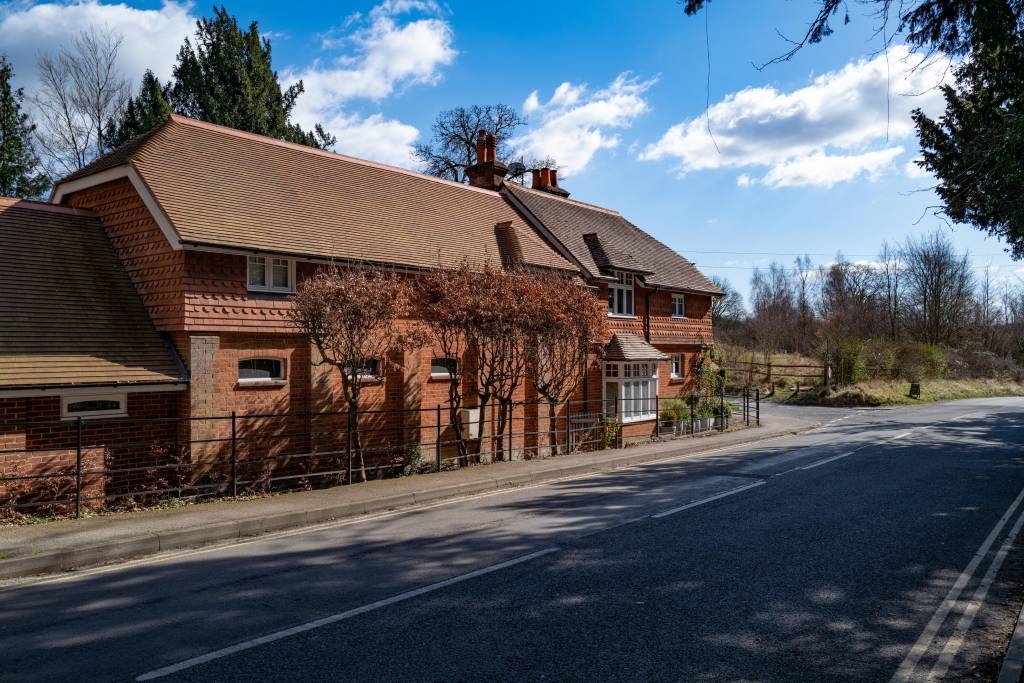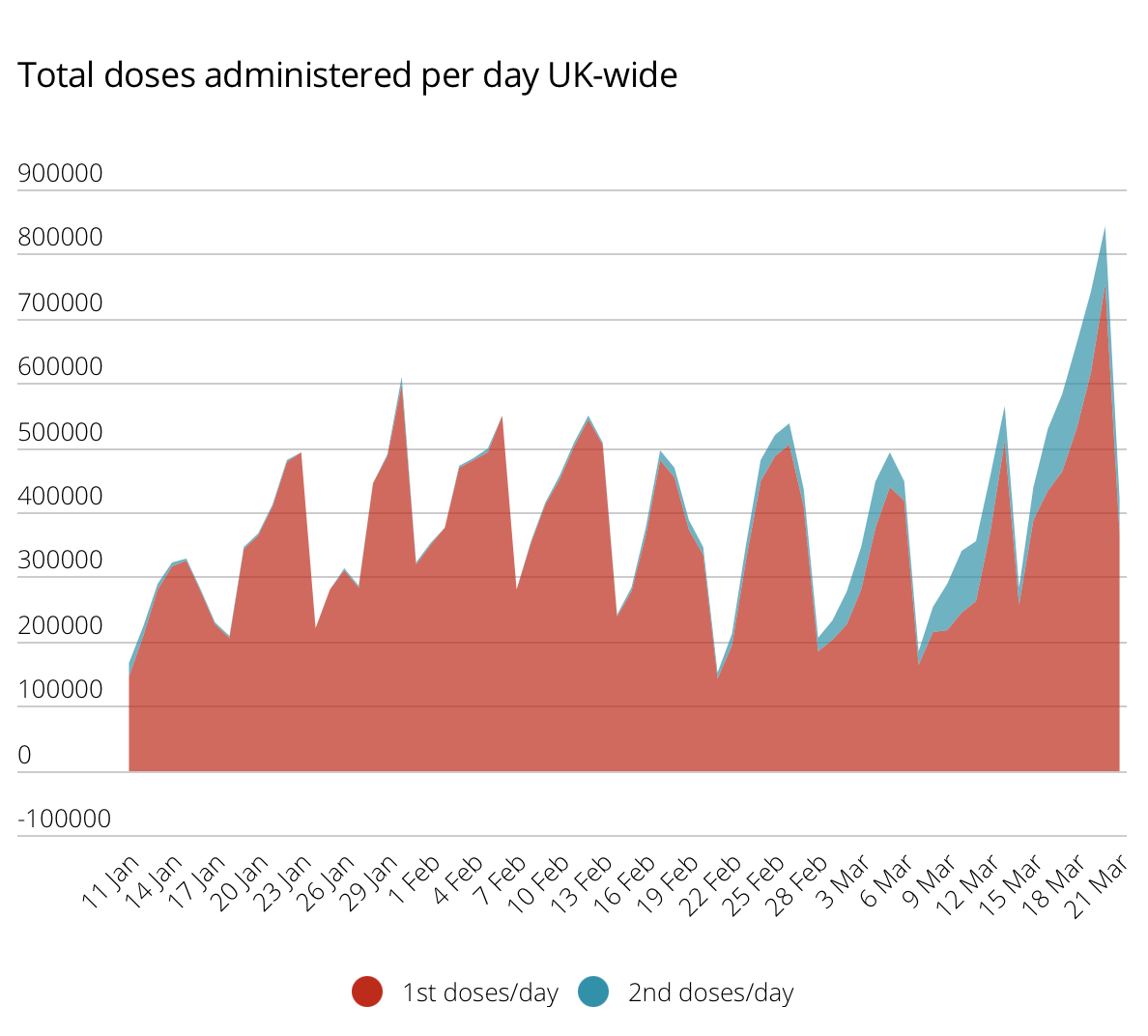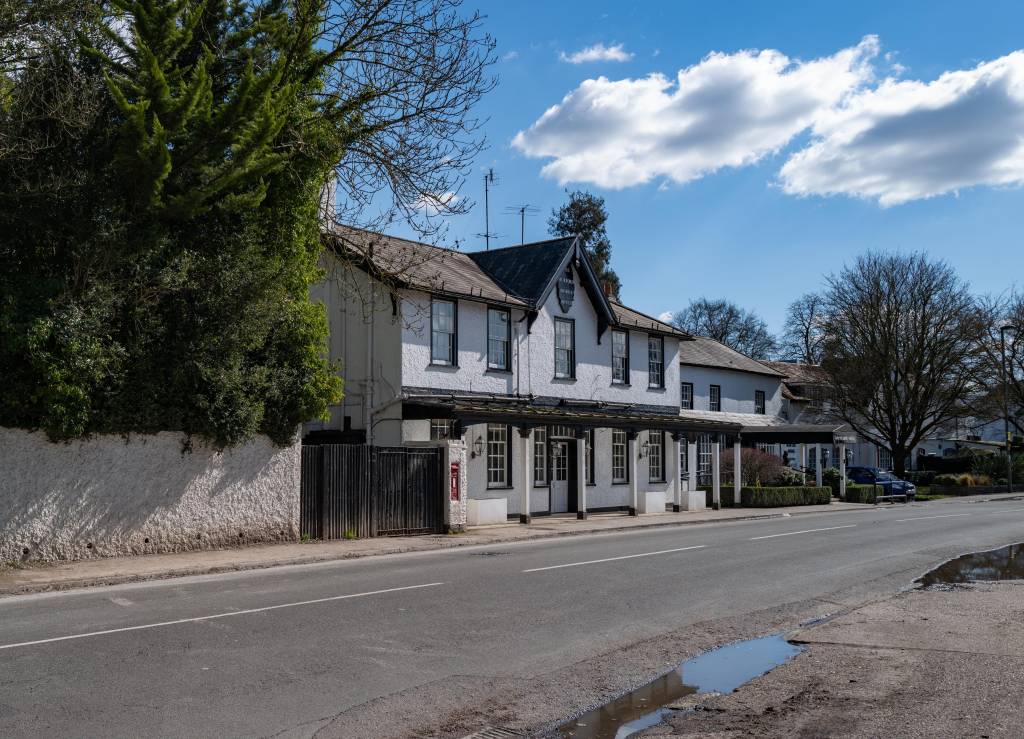This week is a time for reflection on the past year of the Covid pandemic. Here in Britain, in common with many other counties, we were starting our first lockdown a year ago today. We all faced an uncertain and worrying future but, thanks to extraordinary efforts by the scientific community, there is now some hope we can return to normal.
A year on, and most Macfilos readers will have lost friends or, in some cases, family members. Many of us will at least know of someone who has died or has suffered a serious illness. It has been a rocky road, both in human terms and with individual governments’ approach to coping with the situation. “Unprecedented” has been an overused word during the year, but the disruption and death are certainly unprecedented in our lifetimes.
Britain did not handle the first stages of the epidemic well. We were late to lockdown, irresponsibly late in imposing a quarantine on incoming travellers, and thoroughly tardy in test and trace procedures. But while the government lost battle after battle along the way, there are now signs that it could be winning the war.

Lives saved
Over the past four months, the government’s single-minded concentration on the vaccination programme has reaped enormous benefits. Thousands of lives have already been saved in this country, and many thousands more people will benefit from the early action taken in the face of criticism from zero-risk advocates. While no one will overlook all the earlier missteps, the vaccination drive is perhaps redemption for past sins.
The reason that we have now vaccinated over half the population, with jabs now running at just under one million a day, is because the government was prepared to take enormous risks. Some might say they were unacceptable risks. But in a war, risk is everything: “Who dares wins” is a motto we are often in danger of forgetting in these days of extreme risk aversion.
The government’s first big risk was to appoint an outsider, an entrepreneur by the name of Kate Bingham, to take over the vaccination programme. The naturally cautious bureaucrats were thankfully sidelined.
Kate Bingham saw the importance of government funding of development, for instance, in the Oxford/Astra Zeneca case. She also took enormous risks in ordering unproven vaccines in large quantities, even before there was any real hope that we could find a solution in such a short time.
Bold decisions
More risk was taken last November when the regulatory authorities decided on behalf of the United Kingdom to approve the Pfizer and AZ vaccines for public use when other countries were still procrastinating. Understandably, there is a tendency to err on the side of caution in such situations. But, again, bold decisions were needed, and the authorities took them.

I find it particularly interesting that there has been little if any anti-vaccination sentiment in this country. The AZ vaccine, which has had more than its fair share of trouble internationally, seems to have been accepted without question here, and many millions of doses have been administered.
While I received the Pfizer vaccine, I would have been equally happy to take the one from AZ. Nothing I have read shows that one is more or less effective than the other, nor that one carries a greater risk of side effects. Both vaccines have been proven highly effective in preventing serious illness and almost 100 per cent effective against death. That, surely, is a vindication of the risk.

First-dose priority
Another massive risk taken by the scientists was to ignore the drug companies’ advice that a second vaccine dose should be administered after three weeks. Again, the gamble paid off, with a first dose being shown to give up to 85% protection against serious outcomes. More countries are now adopting this pragmatic approach. As a result, the vaccination programme has been able to power ahead, offering good protection to as many people as possible in the shortest possible time.
On January 7, I wrote about my first vaccine shot, and tomorrow I will get my second booster jab. As far as I know, all UK Macfilos readers in the over-55 age group have also had their first dose and can feel well protected. Infections, hospital admissions and deaths are now falling dramatically, and I can sense a new optimism about.
Despite this, however, we remain in one of the most stringent lockdowns, with only local travel permitted and with all non-essential shops, cafes and pubs closed. Most of my friends haven’t had a haircut for three months. This is the one big advantage, I find, in having no hair.

Of course, nothing is for certain. New strains will emerge; vaccines may not be as effective against them. But, at least, we do have the vaccine technology, and we can hope that in future we can quickly make adjustments to cope with variations, just as we have done for decades with the influenza vaccine. However, despite the great advances that have been made here, we won’t be able to rest until a much larger proportion of the world’s population is vaccinated.
One of Kate Bingham’s tasks supporting the Astra Zeneca vaccine’s development was to ensure it would be available at the least possible cost to the widest congregation. At around $3 per shot, it is the cheapest of the western vaccines, far cheaper than Pfizer and the others.
That’s because the much-maligned Astra Zeneca is one of the few drug companies to have undertaken a no-profit approach, largely at the behest of the British government. The task now is to get the vaccine out to the world as quickly as possible to allow us to get back to normal. I hope we can offer surplus vaccine doses to other countries that are not protected to the same degree.
What’s the betting Kate will be Baroness Bingham by this time next year? She will have earned the honour far more than most of the political time-servers sitting in the upper house.
UK Vaccine Task Force end-of-year report
Make a donation to help with our running costs
Did you know that Macfilos is run by five photography enthusiasts based in the UK, USA and Europe? We cover all the substantial costs of running the site, and we do not carry advertising because it spoils readers’ enjoyment. Any amount, however small, will be appreciated, and we will write to acknowledge your generosity.

I know I look at this from a very unique position, and think many things in the UK have gone very well despite some of the odder demands being made in recent weeks.
I accept we could have managed our borders differently, but we are also dependent on imports as a nation, so a balance was always needed, but perhaps on reflection it could have been better.
The one thing I have learned from catching COVID and having a near miss, is that human behaviour certainly in the UK is particularly selfish, and challenging. I caught it by someone having tested positive still went into work, and helpfully gave my wife the disease, this then spread through our home and nearly killed me. But this is not unique, the people I know locally who have sadly passed would tell similar stories, of people breaking the so called rules and the impact that has is irreversible.
I think in the future history will look back and reflect that we did the best we could. There is no definitive response on these occasions, and where we did well was the vaccine strategy, and a willingness to use experimental medical treatments to save people.
Tomorrow I will have my jab and join the vaccinated club. yay. I am nervous about having a reaction to the jab as my body should in theory recognise the virus elements in the vaccine.
Dave, As you know, I was aware of your experience and I didn’t mention it in the article since I thought you would comment. One good that might come from the pandemic is a greater awareness of the importance of taking care when you know you are ill. For most of our lives we have taken colds and flu as an inevitability, never thinking that wearing a mask when a sniffle appears might prevent passing it on to others. I’ve always admired the way masks are worn in many parts of Asia to protect strangers. I used to think people wore masks to protect themselves, but I not realise that if anyone who has a cold or flu and insists on going out and about, they should have the sense to wear a mask. Until the pandemic mask wearing was oddball; now it is routine and perhaps this isn’t a bad thing.
The mask is the one area that has driven me around the bend during the pandemic. It saves the lives of your fellow citizens, it means that if you do have the virus and sneeze or cough the aerosol transmissibility reduces hugely – and still people insist on either not wearing them, or using them as chin accessories, or lip covers (with nose poking out) all scenarios that mean the wearing bit is pointless.
Yes they are annoying, and unsettling, they make your nose run – but perhaps I am hard wired to look after others and not wish this upon them – before I caught it.
I should write an article not about the disease parse’ but about the data from my apple watch – for example my resting heart rate was on average 53-56 beats per minute last year, when I started wearing it post covid it was somewhere between 66-72. It is only now starting to return, but even then it is very random. This is one side affect virtually no one talks about. I also suspect I have asthma, having never had anything similar.
For me it is the disease that keeps on giving.
William, Australia also appears to have the virus totally under control. There are zero cases in Australia currently apart from some returned travellers in quarantine. Life is almost back to normal. Australia has only had 35 covid deaths per 1m of population compared well over 1500 deaths per 1m of population in many countries.
Living in a remote location with droughts, flooding rains and bushfires does have its compensations but also our health authorities really have handled the crisis extremely well overall so far.
Hey John. I think that Australia qualifies as one of William’s “one or two other remote locations”.
But, for other readers, John’s indication is quite true. Australia is having zero community incidence or transmission thanks to a watertight quarantine protocol for overseas passenger entries, along with careful monitoring of the staff at quarantine facilities (we learnt the importance of that the hard way).
Australia is now rolling out the AstraZeneca vaccine. It bases its policies on science, not scaremongering.
John and Wayne, l am delighted to hear that and well done to your authorities, but each country is in a different situation. Here in crowded Europe, with land borders etc the opposite is the case and several countries have had to re-introduce lockdown measures eg Italy and Germany. Vaccination Programs are only part of the answer in fighting the disease across the planet. If you look at the worldwide situation, the disease is very much ‘out there’. The Worldometer site shows that the curve for cases for the entire planet is very much heading upwards at present. Some Mediterranean countries which are very much dependant on tourism now want to open up for holiday flights which would not seem to be the wisest thing to do at this time. Where I live not only have our medical authorities done a tremendous job, our political decisions have been based 100% on medical science and not on scaremongering of any kind. Our authorities have handled the situation very well. We are in a different location to you, however. Whatever way you look at it Australia is not in its usual situation as regards international travel. This will all work itself out over time, but how long this might take is impossible to predict at this point in time. Global coordinated solutions are required to get the whole planet back to where it was in 2019.
William
Agree with you completely. Developed nations should be able to make intelligent decisions and have the where-with-all to implement them. It isn’t so straightforward for poorer developing nations.
Let me start by saying that I hope the Macfilos readers are all safe from Covid and that any who have contracted it have either recovered or on the way to recovery. Also we should remember those who did not make it through. This is as significant a global event that I can remember in my almost 72 years. I use the term ‘global ‘ here carefully, as that is what this is, a global pandemic, the likes of which we have not seen for a long time. The fact that we are all so mobile these days has speeded up the spread of the disease, of course, and has thwarted attempts to control it.
The disease also shows itself very capable of mutating into more virulent/infectious strains and we are a long way from ‘declaring victory’. The need for annual boosters, as with flu injections, may also arise. Unfortunately, a lot of the rhetoric from politicians recently has not been helpful. This is a global pandemic, but politicians will, of course, always look to keeping the ‘home electorate’ happy. Winning the war against Covid could be Pyrrhic if some or all of the countries with which your country trades are ravaged by Covid eg if Leica had to close for a very extended period because Germany could not manage to eliminate Covid, not that that such closure would be hugely important in the wider scheme of things, compared, for example, to the impact on the population of Germany. Likewise for travel, your population might be all jabbed up with nowhere to go and so on. And, of course, the people in the less well off parts of the world will suffer the most as they always do.
At this first anniversary it is probably also appropriate to look at the changes that this monumental event has caused and which are unlikely to go back to ‘normal’ again. People who were ‘ahead of the curve’ on these issues can just ‘glow quietly’ about this.
1. The way we pay for things.
2. The way we ‘go to work’ and ‘do business’.
3. The way that we consume.
4.The way we travel and the amount of travel that we will/can do.
5. The way that our Governments communicate with us
6. The way that we are entertained.
7. The way that we ‘meet’ our families, friends and, indeed, strangers and interact with them .
I could add to that list and I am sure that many more items will be added to it before the new normal is established.
William
Indeed, it’s a complex story. While I applaud the risk-taking on the Vaccine roll-out, I am less complimentary about the continued stringent lockdown. For instance. the complete travel ban has been extended to July, with £5,000 for attempts to leave the country and we will have to wait until mid-May to be able to sit in a cafe. So perhaps we are being over-cautious in this respect. I think, though, I’d rather be vaccinated and not able to travel rather than allowed to jet off anywhere unprotected. At least, I suppose, I could travel to Dublin because there are no borders.
You would be welcome here in Dublin at any time, Mike but I can only travel 5km except for certain specified purposes. We have introduced quarantine hotels, but I don’t think that they are being used for UK travellers. The whole thing is very carefully balanced at the moment and I, for one, support a continued lockdown here until we have the disease under control. There is no sign of that happening anywhere in the world at the moment apart from New Zealand and one or two other very remote locations. I presume also that all Governments are now listening to the medical advice that they are receiving. Past attempts to ignore such advice have cost a lot of lives.
William
Hi Mike,
Last September my father took a fall and was hospitalized for 4 weeks. My wife and I decided it was time to move in with my father to take care of him. We sold our house in a day and moved into his small 2 bedroom bungalow. Two weeks ago, on his 93rd birthday, my dad got the Pfizer jab. Ottawa Public Health advised us that the second dose will be in 14 weeks as they plan to inoculate as many people as possible with an initial dose.
Vaccines destined for Canada trickled in at the start of the year but now the supply chain is ramping up. To date the City of Ottawa has reported 16,188 Covid-19 cases with 456 deaths for a population of around 1 million. We are at the cusp of a third wave with the UK variant soon to be the prominent strain. Vaccines appointments have just opened for those aged 75-80. I am 66 and look forward to boking my appointment sometime in April. My wife who works for an eye surgeon is scheduled to get her shot soon.
As a country Canada has fared better than most in weathering the pandemic. As a nation we look fondly at the UK for how they have undertaken vaccine manufacturing and rollout. As a nation we will need to do better to ensure we have what it takes to fight the next pandemic.
All the best to you tomorrow when you get the second jab.
Cheers, Jim
Thanks Jim. I wish you all well, particularly your father. I wouldn’t worry about the delay in the second dose. Already the statistics are proving that it was a sensible decision to delay. We’ve had one of the highest death rates in the world, but let’s hope the average will reduce as the vaccine protection kicks in.